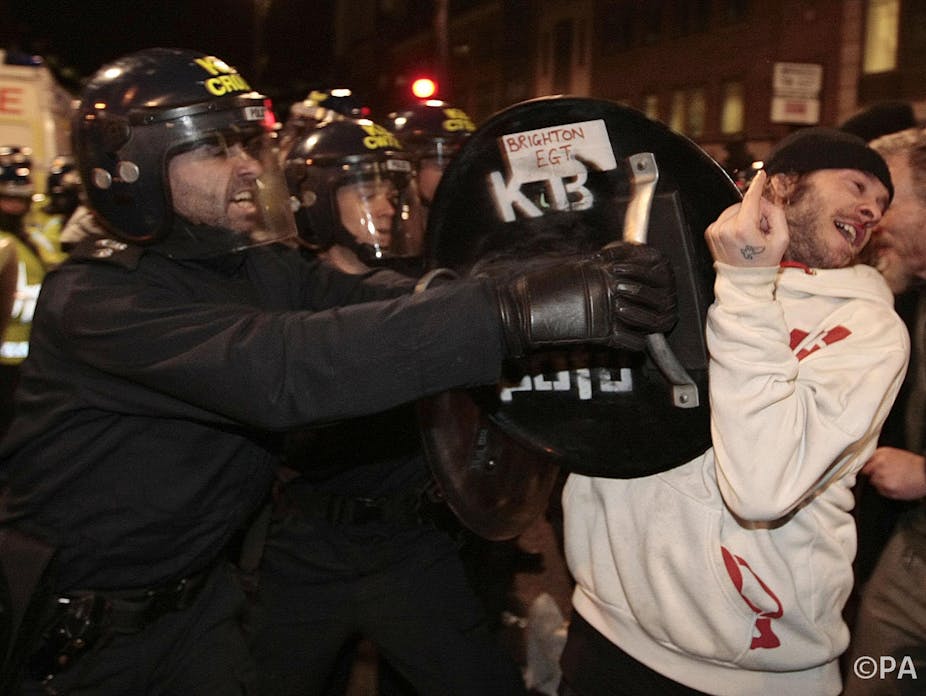Over the past ten years, 519 people have died after contact with the police, either in custody (the great majority) or during a pursuit or another road traffic incident. Some 23 people have been shot by police during the same period.
Rarely are those deaths regarded as a part and parcel of the normal business of policing; they tend to be understood as rare and perhaps as an unfortunate but necessary aspect of police work.
Strong arm of the law
In an essay published in 1919, the German sociologist Max Weber showed clearly the centrality of violence to the modus operandi of the modern state. According to Weber, the modern state is defined by its ability to resort to physical force. The power of the state, for Weber, was defined by its monopoly of the legitimate use of force.
The legitimate use of violence by the British state goes largely unchallenged. In all of the recent public discussions about police violence, we have not questioned the principle of the police to decide whether to use force in every situation deemed necessary. No British police officer has ever been sent to jail for killing a member of the public. Custodial sentences for police found guilty of any form of violence are very rare.
Even in the most highly publicised cases where extreme police brutality has been filmed, officers are generally not given custodial sentences. In the very recently reported case of Frank Fearon and Sarah Reed, a member of the public could not have escaped prison for such brutality without a major outcry. A string of failures in the Independent Police Complaints Commission and other police accountability mechanisms in the past couple of years have grossly undermined their credibility.
Military-industrial complex
The same goes for the deployment of state violence abroad. A report by The Guardian recently noted that Britain has been involved in active military combat somewhere in the world in every calendar year since 1914.
Like those faced with police violence, anyone who has faced violence at the hand of the military knows what this means, if you survive to make a complaint. The chances of military tribunal for soldiers in conflict are low, and again only occur in the most extreme cases where there is indisputable evidence, such as in the case of Alexander Blackman.
Of course, for any law enforcement or military structure to work, there needs to be some recourse to violence. The authority retained by state institutions and other powerful institutions to deploy violence is hugely destructive. In criminology, it is now accepted as an article of faith that governments, state institutions and private corporations together kill more people, maim more people and steal from more people – many times over – than individuals.
The UN Office on Drugs and Crime estimated the total number of homicides as around half a million a year; International Labour Organisation data shows that five times as many people are killed by working; and the World Health Organisation estimates that more than 14 times as many people are killed by illnesses caused by pollution than are killed by homicides.
Corporate violence
The immediate causes of most deaths caused by working are wholly avoidable (as are many of those caused by air pollution), but result directly from decisions taken by managements in corporations and state institutions. Weber, writing in the earlier 20th century, could not have foreseen the mass expansion of the private profit-making corporation as a key institution in modern societies. Yet, it is clear that corporations, under licence granted by states, are major authors of violence. Indeed, corporations are responsible for the bulk of deaths caused by working, and caused by pollution.
Take, for example, two recent examples of mass killings in the Bangladeshi and Pakistani garment industries respectively. In each of those cases, imminent dangers to workers were known about by managers and by some of the European retail outlets being supplied the garments, and yet managements and the clothing retailers exhibited wilful blindness in the general aim of maintaining high profits.

No company director sets out in the morning to intentionally kill workers. Yet directors do very often set out in the morning to make decisions that cut margins, intensify production conditions or cut back on working conditions. A more routine and premeditated form of violence than you get from cases of inter-personal violence. But the victims suffer deaths that are every bit as violent and painful.
When we begin to explore deadly consequences of corporate activities we find violence writ large. Of course, some of the beneficiaries of the appalling conditions endured by third-world workers in the garment industry are first-world high street brands. British oil companies are regularly accused of the destruction of local habitats and the poisoning of communities in West Africa and of benefiting from paramilitary violence in Latin America; British agibusiness abuses human rights in Africa; British mining companies rely upon the brutal suppression of local people in order to flourish.
And so on, and on.
In the business of war, Britain is proud of its leading role. It has one of the largest arms manufacturing industries in the world and the second biggest private military sector; almost a third of all registered private military companies are headquartered in the UK. Violence is indeed big business in Britain.
A conference in Liverpool on May 16 – How Violent is Britain? – will examine this issue in detail. This is the first in a series of articles on this theme on The Conversation.

